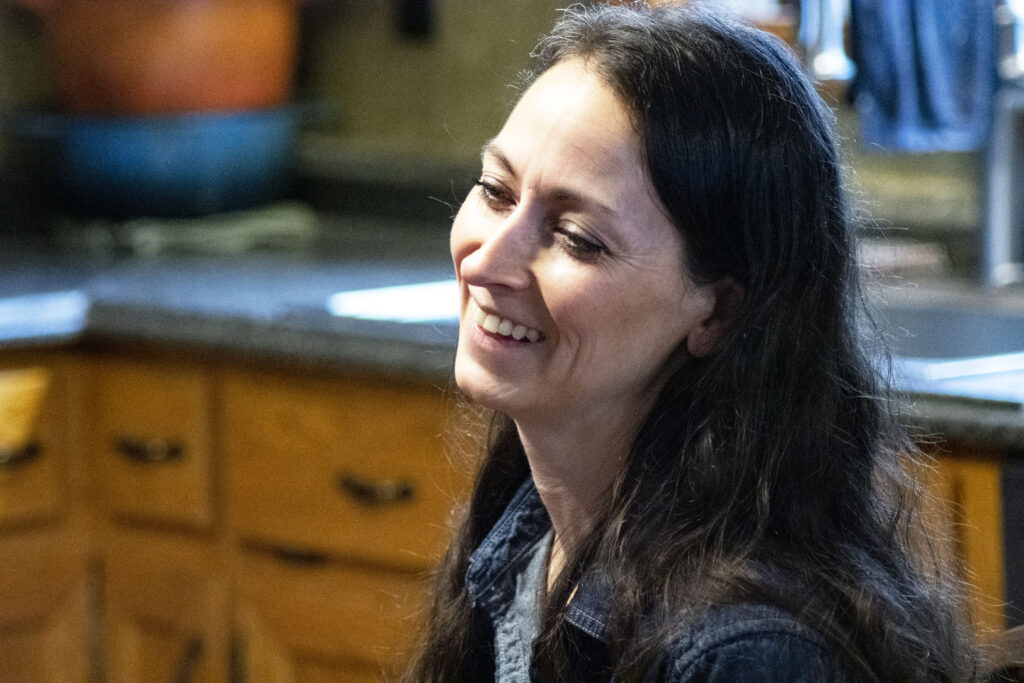
The Burkhart family’s academic lessons often take place at night.
Because the Hodgdon family homeschools, the children can pick their days, times and educational activities as long as they meet the state mandated 175 school days a year.
“My kids help on our farm, work for others, come to work with me and have the opportunity to plan ahead if an event is coming up,” Erica Burkhart said. “We have the ability to say ‘yes’ to travel and other opportunities because of our flexibility.”
The Burkharts are among a growing number of families around Maine and the nation who find the flexibility, choice and family togetherness of homeschooling meets their needs and goals better than public education.
Erica Burkhart, a state licensed teacher, said she and her husband have been homeschooling for many years and choose this path for their five children because of religious freedom, a flexible schedule, the ability to meet the various learning styles of their children and more time to do other things with the family.
“I know public school teachers do the absolute best they can in differentiated learning, but our home has a classroom of five, not 25,” Burkhart said. “It’s simple math, two parents to five students is a better ratio.”

Homeschool enrollments are rising in Maine with some districts seeing increases of nearly 100 percent or more in four years. Bangor’s school district went from 104 registered homeschoolers in 2020 to 206 in 2024; Houlton, from 46 to 84; Hodgdon, from 15 to 51, Auburn 101 to 204; and Mt. Blue Regional, 123 to 323, according to the Maine Department of Education data warehouse.
Nationally, homeschooling, spurred by the pandemic, is the fastest growing form of education, according to a Washington Post analysis based on nationwide data. For example, in Tennessee, homeschooling has grown 77 percent in five years while Washington, D.C. has seen a 108 percent increase in that span.
The surge comes at a cost to public education. State superintendents talk about declining enrollment tied to homeschooling and how that affects the bottom line. Fewer kids in schools means less money from the state.
In the U.S., taxpayers spend an average of $16,446 per pupil annually in public schools, plus capital expenditures, according to the National Education Association. In Maine it’s between $12,000 and $20,000. For example, in Kittery it is $20,031 while in Houlton it’s $12,037, according to the department of education.
Recently, Houlton’s RSU 29 was forced to cut positions and programs to meet a $1.1 million shortfall. The towns later voted to increase the local allotment to save positions and programs but that is only a temporary fix, said district administration.
This year the district has about 84 homeschoolers, according to Superintendent Joe Fagnant. At the state $12,037 per pupil funding, it just about equals this year’s shortfall, he said.
Former RSU 29 board member Michelle Henderson, who recently resigned from the board, said she believes public schools are failing children and teachers. She points to Maine Department of Education LGBTQ+ policies regarding gender roles and preferred pronouns, saying they are distractions that take away from academics.
“These unnecessary distractions could not only get in the way of a childs’ education, but what is it doing to their emotional well being?” she said. “I can’t understand for the life of me how we got to this place.”
The National Education Association offers a guide for teaching gender neutral and preferred pronouns and says their use is important to non-binary students. The NEA points out the use of “they” as a singular pronoun dates back to the 1300s and is grammatically correct.
Fagnant said that the district administration knows that parents and community members have differing views on LGBTQ+ rights, specifically with transgender students.
“We understand that everyone does not agree with Maine laws, but we as a public school do not discriminate,” he said.
Henderson said she has several friends who homeschool their children, quite successfully.
“They are just as active in sports and academically successful as any student I’ve seen,” she said.
Homeschooling was an option for Henderson a few years ago when she pulled her two children out of public school, she said. But instead she chose Greater Houlton Christian Academy and has been more than pleased, Henderson said, adding that she remains very open to homeschooling.
Fagnant said that as education evolves, he wants homeschool parents to know that there are many free options for them at the high school and that students can attend partial days or individual classes as a homeschool child.
He points to opportunities in art, math, science and extracurricular activities that could enhance the homeschool experience.
Additionally, in 2023, RSU 29 opened Shire Connections Online Courses. To use the program, homeschool students can stay at home, but must enroll in RSU 29 and follow state immunization requirements, he said.
“You would be able to access these online classes at no cost,” Fagnant said. “This program does have teacher support and access to student services.”
Randi Farrar and her husband Tom, from Hodgdon, decided to homeschool their children because there were things happening at school they did not want their children exposed to. Additionally, she said several of her 16-year-old daughter’s friends started homeschooling because of bullying.

“They were telling me about kids vaping and intimate activities,” she said. “We thought we would like to go back to an old fashioned lifestyle and I wanted Christian-based learning.”
Farrar loves the inventiveness and possibilities in homeschooling and the way real world activities can be incorporated into lessons like cooking and measurements. And she believes that the rise in homeschooling is not a trend but will become the norm.
“So many parents call me and ask, ‘How do you do this?’” she said.
Kelly Schwalbert started an informal Facebook group Houlton Home Schoolers several years ago and now there are more than 300 members who support each other with information on state regulations and lesson ideas.
With families from Benedicta to Fort Kent, the Houlton area and northern Penobscot County, Schwalbert’s group facilitates social activities like weekly ski outings, proms, dances and other extracurricular activities.
“We have about 50 to 75 kids that come to our structured events,” she said.
Some of the families in the group started homeschooling because the public school was unable to meet their child’s needs, bullying, safety issues and sometimes parents with special needs children felt the school was not supporting them so they pulled their children out, she said.
During recent RSU 29 budget discussions, Schwalbert said some parents were upset because the children were looked at as a commodity or a price per pupil.
“We don’t look at kids as commodities,” she said.
Schwalbert has been homeschooling since 2018. When the family moved to Littleton from Colorado it found that there were few charter or magnet schools in the state, leaving little curriculum choice.
“Families want choices for their children,” she said.
Fagnant said he sent a letter in March to homeschool groups in the district, hoping to start a conversation and trying to understand what they needed from the school district. Only two returned his survey.
Schwalbert said the home school group put Fagnant’s request out to the families in their group and that members were not interested in participating in the survey.
All homeschoolers must follow the state guide for required topics and at the end of each school year, student work must be assessed and filed with the district.
Burkhart, because she is licensed in the state, often helps parents with assessments, she said.
“I enjoy getting to help families navigate their homeschool journeys and getting to celebrate annual accomplishments when I review portfolios,” she said. “This happens when their school year is completed (175 school days) anytime, typically from April to September.”
The state can do a better job supporting homeschoolers, some said. The Burkharts moved to Maine from North Carolina and Erica Burkhart said Maine has more strict requirements for proving progress and engagement in homeschool yet there’s no reward for that accountability through a state-issued homeschool diploma.
North Carolina is more loose in its requirements, according to Burkhart. “But they do offer a homeschooling diploma, which I think is important for students who want to carry on higher education,” she said.
As far as the kids, they love the freedom and inventiveness of homeschooling, several parents said.
“I think my kids like the flexibility more than anything else. They enjoy getting to see their friends on a regular basis. I think one of our favorite activities is the ski for life program,” Burkhart said. “We get there early before the public school group arrives and ski the entire day with our friends. We pack lunches and dinner and we take over part of the lobby, and make great memories.”







